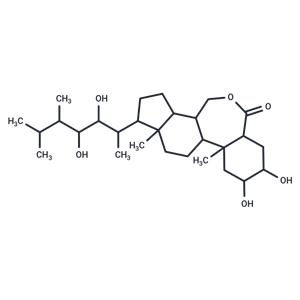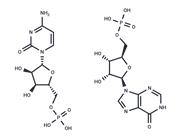| Name | Brassinolide |
| Description | Brassinolide (Brassin lactone) is a plant hormone isolated from rapeseed (Brassica napus) promoting stem elongation and cell division. |
| Cell Research | Brassinolide is dissolved in DMSO and stored, and then diluted with appropriate medium before use[2]. MTT method is used to detect the resistant factor of resistant cell line and the reversing fold after addition of Brassinolide. The intracellular accumulation of rhodamine 123, a fluorescent dye transported by P-glycoprotein is detected by flow cytometry, the catalytic activity of topoisomerase II is assessed by Sulliven method to find the effect of Brassinolide on resistance. The protein expression of p53 is measured using Western blotting in the sensitive cells and resistant cells to explore the effect of Brassinolide[2]. |
| In vitro | Brassinolide, a plant sterol isolated from rape pollen (Brassica napus L.), demonstrates both growth-modulating properties and potential anti-cancer activities. In PC-3 cells, Brassinolide induces cytotoxicity in a time and concentration-dependent manner, primarily through apoptosis. This is evidenced by increased Caspase-3 activity, and a decrease in the anti-apoptotic protein Bcl-2, as confirmed by various microscopy techniques and flow-cytometric analysis. These findings position Brassinolide as a promising candidate for prostate cancer treatment[1]. Furthermore, Brassinolide shows efficacy in reversing multidrug resistance (MDR) in the human T lymphoblastoid cell line CCRF-VCR, which develops resistance through exposure to vincristine (VCR). Treatment with Brassinolide at concentrations between 0.001-10 μg/mL partially reverses this resistance and enhances the intracellular accumulation of rhodamine 123, indicating a reduction in drug efflux mediated by P-glycoprotein. Despite showing no change in topoisomerase II activity, Brassinolide treatment normalizes the elevated levels of p53 protein in resistant cells to those seen in sensitive cells. This suggests that modulating p53 expression could be a mechanism by which Brassinolide reverses MDR[2]. |
| Storage | keep away from moisture | Powder: -20°C for 3 years | In solvent: -80°C for 1 year | Shipping with blue ice. |
| Solubility Information | DMSO : 60 mg/mL (124.82 mM), Sonication is recommended.
|
| Keywords | plant growth modulator | Brassinolide | Apoptosis |
| Inhibitors Related | Stavudine | 5-Fluorouracil | Flubendazole | Cysteamine hydrochloride | Myricetin | Dextran sulfate sodium salt (MW 4500-5500) | Sodium 4-phenylbutyrate | L-Ascorbic acid | L-Glutamic acid | Tributyrin | L-Ascorbic acid sodium salt | Alginic acid |
| Related Compound Libraries | Anti-Tumor Natural Product Library | Apoptosis Compound Library | Pesticide Compound Library | Bioactive Compound Library | Traditional Chinese Medicine Monomer Library | Selected Plant-Sourced Compound Library | Natural Product Library | Tobacco Monomer Library | NO PAINS Compound Library | Natural Product Library for HTS | RO5 Drug-like Natural Product Library | Bioactive Compounds Library Max |

 United States
United States



